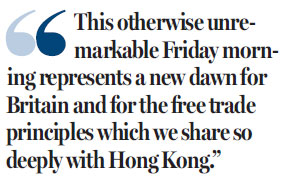Vote is a new dawn for UK and free trade
Updated: 2016-06-27 07:32
By Tim Collard(HK Edition)
|
|||||||||
And so it's happened. Against the advice of all the experts and international bigwigs, the United Kingdom has voted to leave the European Union (EU) and strike out alone into uncharted waters. There has been some fine apocalyptic rhetoric over the last few days as the "Brexit" campaign gathered momentum in the final stretch, as if such an outcome would herald the end of the world as we know it. Not only Britain would be devastated, but all that part of the world which trades and invests in the world's fifth-biggest economy would suffer lasting negative consequences. Much of this one can discount as campaign propaganda, intended to scare the voters into opting for caution and the status quo. It hasn't worked. One thing the British and the Chinese really do have in common: We don't respond well to being bullied and hectored and told what to do.
Yes, there will be turmoil on the markets for the following week or so. Those who are heavily invested in the UK, including a number of Hong Kong tycoons, are likely to take a big hit as the first move for the pound sterling is certain to be downward. Prime Minister David Cameron didn't intend this. He wanted a fairly peaceful procedure when he promised a referendum on continued EU membership; he would negotiate a few attractive reforms with his EU partners, present them to a grateful British public, and that public (which didn't really want any major upheavals) would deliver him a thumping majority, after which his government would have an even stronger mandate to pursue an active international policy. Well, it didn't turn out like that, and Cameron's days are numbered. One of the main criticisms of the "Leave" campaign was that they had no real idea what would happen next following a victory at the polls. Too true. Now we are forced to ride the storm - and take what opportunities we can to shape the future.
There is no need to assume that the market turmoil will be long-lasting. It is the nature of markets to sort themselves out and price in potential pitfalls and opportunities. But what pointers does this outcome give to Britain's future engagement with the world, with special reference to Hong Kong and the Sinosphere?

In the first place, this should not be taken as a British wish to turn our backs on the world. Quite the reverse. Trade with the EU countries will have to be re-regulated, but they need us at least as much as we need them. It is, of course, unrealistic to expect our trading relations to center predominately on the former colonies again, as they did before we joined the EU in 1973 - the world has moved on. And one of the main ways it has moved on is in the emergence of China as a great economic power. Hong Kong, of course, is no longer a colony, nor really part of the Anglosphere, but still has powerful links to the UK - which is why Li Ka-shing and the other big players are so heavily involved here - and we will now redouble our efforts to maintain and expand these links, sailing under the banner of free trade.
Free trade was always a problem while we were in the EU. While our partners were devising elaborate plans for ever-closer political union, we kept on saying that we didn't want that, we wanted a free trade association. They got tired of hearing this, and relations soured. We always had a tendency to be semi-detached from "core Europe"; we refused the single currency and the Schengen Agreement. We wanted free trade, and that was not a priority for mainland Europe. In fact, now that the incessant British parrot-cry is gone, the EU may lean toward a more protectionist approach, which will not be good for Hong Kong and the Chinese mainland. Britain may find herself in the lead again by offering a more open approach than our erstwhile partners.
So, this otherwise unremarkable Friday morning represents a new dawn for Britain and for the free trade principles which we share so deeply with Hong Kong. It will be a bumpy ride at first, but the entrepreneurial spirit sees only opportunities where others see doom and gloom. The balance of economic power has shifted eastward, and we will not forget that. We were the first Western country to sign up to China's Asian Infrastructure Investment Bank project; and, while we can hardly claim to be geographically part of the Belt and Road concept, we will be as keen to participate as any European country. Here, of course, Britain has a clear synergy with Hong Kong in the territory's bid to become the financial hub for the program. After months of internal European squabbling, Britain now expands her focus. Welcome to the new world.
The author is a former UK diplomat specializing in China. He spent nine years as an analyst in Beijing. He now works as a freelance writer and commentator.
(HK Edition 06/27/2016 page12)